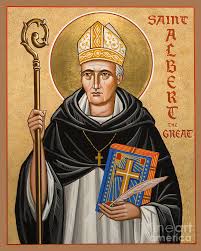Living as Joyful, Just and Suffering Saints in the Kingdom of God
(Phil 7-20; Ps 146; Lk 17:20-25)
************************************
What do you think? Can joy and suffering co-exist?
The readings today invite us to live as joyful, just, suffering saints in the Kingdom of God.
In his letter to Philomon, St. Paul refers to the disciples he has evangelized as saints. The rest of the readings spell out what it means to be a saint following Jesus.
In the gospel, Jesus is clear it means living in the Kingdom of God that is both present reality and future fulfillment. This reference (Luke 17:21) is the only place in the New Testament where Jesus does not just say the kingdom of God is near or one is not far from the kingdom, he actually states the kingdom of God is here, present, among and within us.
That is an amazing revelation, one which inspired my motto as a bishop – Regnum Dei Intra Vos– “The Kingdom of God is among you.” So, on the one hand, to be a saint is to be living within the reign of God and sharing the very same eternal life of peace and joy that is the reality of the Trinity, Father, Son and Holy Spirit, a perichoresisor divine dance of constantly outpouring love.
On the other hand, to be a saint here below is to live within an infinite horizon of hope, because the fulness of the kingdom, when Jesus returns in his fullest glory, is still to come. We are actually keeping vigil, waiting in hope, like the woman who asked in her will to be buried with a fork in her hands, because her mother always told her at meal times to “keep your fork, the best is yet to come.” This faith-based hope allows us to put into perspective all the pain, hurt, losses and anguish of living life, even as saints, in this wounded world.
Perhaps that is why Jesus is quick to point out, after he explains the “partially realized eschatology” nature of the kingdom, that first the Son of Man must “endure much suffering and be rejected by this generation.” So somehow, suffering is to be part of our experience of living as saints in the kingdom of God.
Throughout the history of humanity, the best of thinkers have all struggled with the mystery of evil and suffering in our world. The Buddha finally decided thwarted human desire was the source of suffering so if we eliminated all human desire that would remove suffering from our lives. However, that inspiration is still an attempt to avoid legitimate suffering. We are so blessed as Christians because while Jesus does not explain the mystery of suffering, he models for us how to deal with it, and that is embrace it and transform it!
As a radical disciple, doing only the Father’s will to reveal to humanity the depth of the Father’s love for us, Jesus accepted pain, humiliation, suffering, torture and even crucifixion, the most painful death of all, without bitterness or resentment. Then, through the power of the Holy Spirit, Jesus transformed that apparent defeat into a glorious resurrection and new life. In this process, the suffering of Jesus became redemptive, full of meaning and purpose, the best way to handle the mystery of pain and suffering.
Therein is the secret to the kingdom of God – if we can do likewise, accept pain and suffering in our lives without bitterness or resentment, however it comes to us, then we are just like Jesus on the cross. On the cross, Jesus was totally at peace, and I believe may even have felt some joy, in spite of the experience of the apparent absence of God, because he knew he was accomplishing the Father’s will to reveal God’s unconditional love for God’s wounded world.
This is a mystery our world does not understand and therefore is stuck with only one way of coping with suffering. That is a desperate attempt to avoid it by all means, including physician-assisted suicide, and addiction of all kinds. One definition of addiction is an attempt to avoid legitimate suffering, legitimate because there are certain life-lessons we can learn only through some suffering. It is our suffering that produces character and adds depth to our personalities, such as empathy and compassion.
The psalm adds the element of working for justice to our lives as saints within the kingdom. Every stanza in that psalm proclaims some aspect of the justice of God: feeding the hungry, setting prisoners free, healing the blind, lifting up the oppressed, watching over strangers, upholding orphans and widows, and bringing the wicked to ruin. If this is what our God is like, and we are saints living within God’s kingdom, then we must emulate our God and make working for justice a priority in our lives. There is a saying, “If we want peace, work for justice.” I believe justice is the basis for a lasting peace.
In a strange twist, I see justice happening in the march of migrants through Mexico to the United States. For decades, US foreign policy has engineered dictatorial unjust governments in Latin America to favor its own economic interests in the form of multi-national corporations. Juan, a friend of Fr. Gerry’s from Guatemala, shared with me how this practice led to the deposition of a very just, caring president of his country, who was a capitalist but tried to bring greater justice to the poor of his country. Because he was not subservient to the multi-national corporations, the US labelled him a communist, managed to de-stabilize the country and replaced him. The reason Juan says migrants are fleeing their countries is because of corruption, unemployment and injustice as the result of this foreign policy. What I see is the foreign policy of the United States created the intolerable conditions forcing the migrants to flee to the United States for a better life, the very country now trying to label them as criminals and build a wall to keep them out. I think in all fairness the US should try to make amends for this unjust policy by inviting them in and helping them in their search for a better life! That would be justice.

US Border wall
St. Paul, in the first reading, adds a delightful tone of joy to our lives as saints in the kingdom. Whoever Philomon was, he had to be a true disciple, because he was able to refresh the hearts of the other saints, and in so doing, provide St. Paul with joy and encouragement. Paul also lobbies for Onesimus, a slave who through Paul met Jesus and became a believer and a disciple. He has a whole new perspective on life, a deeper inner quality to that life, allowing him, hopefully, to return to Philomon perhaps still a slave, but also now a beloved brother in the Lord. Faith may not have changed his external situation, but it has transformed him into a new creation.
This is the message I will be trying to share with the inmates at the Remand Centre to which I am going later this day. They too, need to know they can also be transformed into a new creation in Christ, even while they are being held in custody and awaiting trial to realize their fate.
A saint the church remembers and honors today is St. Albert the Great. Born in Swabia about 1206, he joined the Dominicans, earned a doctorate from the University of Paris, and taught theology. Thomas Aquinas was one of his students and became a close friend and fellow scholar. Albert received the title ‘Great’ from his contemporaries in recognition of his intellectual gifts. He developed original ideas, was an accomplished philosopher, scientist, theologian, administrator and teacher, and a keen student of Arabic learning and culture. He is best known for popularizing Aristotle’s works in philosophy and logic. He initiated the Scholastic method (the application of Aristotelian methods to Christian doctrine), developed at length by Thomas Aquinas. Albert died on this day in 1280 and was declared a Doctor of the Church in 1931. He is patron saint of scientists.

The Eucharist makes present for us, through Word and Sacrament, the forgiving, healing, unconditional love of God for us Jesus demonstrated on the Cross through his redemptive suffering.
May our celebration empower us to live as joyful, just, suffering saints in the Kingdom of God.




Living joyfully and sufferings can co exist when we go through any difficulties and personal problems that is troubling us. Many of us deal with certain affairs and situations that would lead to arguments, anger, bitterness, selfish, stubbornness and resentments that would end up hurting other people. Even people suffering losses of a friend and family members that they love and honor for many years. They have a hard getting over it because they love them for who they are and what kind of person they were on this earth. They are grieving for losses for a love one and this month is celebrating for loss souls. If we do not learn to forgive one another like forgiving ourselves and keep on having this grudge we will not experience this joyful life. If we can ask God to forgive us for our faults, crimes and wrongdoings.If we are willing to change then we will be healed. God is the one that forgives for our sins and heal us if we believe in this Trinitarian God. He can transform us into becoming a completely different person and we can start over again. So, we can have joy and suffering saints in the Kingdom of God. Amen
Thanks Bishop Sylvain Lavoie for sharing the following homily. This is the message we need to hear to be truly saints of God . Those inmates in the Remand Centre can also be transformed into this new creation if they are willing to change. Hopefully the following message can change their minds. God Bless you.